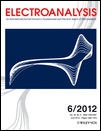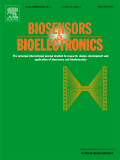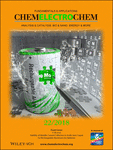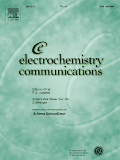
ELECTROANALYSIS
Scope & Guideline
Empowering Researchers with High-Impact Electroanalytical Findings
Introduction
Aims and Scopes
- Electrochemical Sensor Development:
The journal publishes studies on the design and fabrication of novel electrochemical sensors using various materials, including nanomaterials, polymers, and composites, for detecting a wide range of analytes in environmental, biological, and pharmaceutical contexts. - Fundamental Electrochemical Research:
Research articles that explore the fundamental principles of electrochemical reactions, including kinetics, thermodynamics, and mass transport processes, are a core focus. This includes studies on electrode materials and surface modifications. - Application of Electrochemical Techniques:
The journal covers applications of electrochemical methods in various fields such as environmental monitoring, food safety, biomedical diagnostics, and drug analysis, showcasing the versatility of electroanalysis. - Nanomaterials and Hybrid Systems:
There is a strong emphasis on the use of nanomaterials and hybrid systems in sensor design. Studies often explore the integration of nanoparticles, metal-organic frameworks, and conducting polymers to enhance sensor performance. - Sustainable and Green Electroanalytical Methods:
Research contributing to the development of eco-friendly and sustainable electrochemical methods, including the use of biocompatible materials and processes, is increasingly highlighted.
Trending and Emerging
- Wearable and Portable Sensors:
The development of wearable and portable electrochemical sensors for health monitoring and diagnostics is increasingly prominent, driven by the demand for real-time and on-site analysis. - Integration of Machine Learning and AI:
Emerging studies are incorporating machine learning and artificial intelligence to enhance data analysis, sensor design, and predictive modeling in electrochemical applications. - Biocompatible and Green Materials:
There is a growing focus on the use of biocompatible and environmentally friendly materials in sensor fabrication, aligning with global sustainability goals. - Electrochemical Biosensors:
The journal is seeing a rise in research related to electrochemical biosensors, particularly for medical diagnostics and pathogen detection, highlighting the integration of biological elements with electrochemical detection. - Nanotechnology and Advanced Materials:
Research involving advanced nanomaterials, such as 2D materials and metal-organic frameworks, is becoming increasingly common, showcasing their potential to enhance sensor sensitivity and selectivity.
Declining or Waning
- Traditional Electrochemical Techniques:
There is a noticeable decrease in the publication of studies focused solely on traditional electrochemical techniques, such as classical potentiometry and voltammetry, without the incorporation of modern advancements or new materials. - Conventional Electrode Materials:
Research utilizing conventional electrode materials like bulk metal electrodes is becoming less frequent, as the field shifts towards more innovative materials such as nanocomposites and hybrid systems. - Basic Analytical Methods without Novelty:
Papers that present basic analytical methods without significant novelty or improvements are declining, indicating a shift towards more innovative and application-driven research. - Single Analyte Detection:
There is a waning interest in studies focusing solely on the detection of single analytes, with a trend moving towards the development of multi-analyte and simultaneous detection systems. - Low-Impact Environmental Studies:
Research that does not address pressing environmental issues or lacks significant impact in practical applications is being published less frequently, emphasizing the journal's commitment to relevance.
Similar Journals

Analytical and Bioanalytical Chemistry Research
Empowering Global Knowledge in Chemistry.Analytical and Bioanalytical Chemistry Research is an esteemed open-access journal published by the Iranian Chemical Society, dedicated to the advancement of knowledge in the fields of analytical chemistry, biochemistry, and spectroscopy. Since its inception in 2014, this journal has provided a platform for researchers, professionals, and students to publish and access high-quality research articles that contribute to the understanding of chemical analysis and bioanalytical methods. With an ISSN of 2383-093X and an open-access model that promotes global dissemination of findings, it ensures that innovative research reaches a broad audience. The journal has consolidated its presence in the scientific community, currently ranked in quartile Q4 for analytical chemistry, biochemistry, and spectroscopy as of 2023. Its Scopus rankings, including a percentile of 34th in Analytical Chemistry, reflect its commitment to quality research and scholarly contribution. Situated in Tehran, Iran, the journal serves as a vital resource for academic discourse, offering insights into emerging trends and methodologies in analytical and bioanalytical chemistry.

JOURNAL OF THE ELECTROCHEMICAL SOCIETY
Advancing Electrochemical Innovation for a Sustainable FutureJOURNAL OF THE ELECTROCHEMICAL SOCIETY, published by the ELECTROCHEMICAL SOCIETY INC, is a leading peer-reviewed academic journal dedicated to advancing the field of electrochemistry and its myriad applications. With an ISSN of 0013-4651 and E-ISSN of 1945-7111, this esteemed journal has been a pivotal platform for research since its inception in 1948, with convergence periods allowing for a rich historical context of study through to 2024. Recognized for its high impact, it holds a noteworthy Q1 ranking in several categories including Condensed Matter Physics and Materials Chemistry, and it is Q2 ranked in both Electrochemistry and Renewable Energy. This journal features a range of articles that encompass both theoretical and experimental advancements, making it a crucial resource for researchers, professionals, and students keen on exploring cutting-edge developments in materials science, energy solutions, and sustainable technologies. Although it is not an open access journal, its rigorous standards ensure that published work significantly contributes to the body of knowledge within its fields, fostering innovative research and collaborative progress.

Electrochemical Science Advances
Catalyzing Research for a Sustainable FutureElectrochemical Science Advances, published by WILEY, is an esteemed Open Access journal that has been making significant contributions to the field of electrochemistry since its inception in 2021. With an ISSN of 2698-5977, this journal serves as a vital platform for researchers and practitioners looking to disseminate their findings on a diverse range of topics within the electrochemical sciences and related areas. The journal has achieved commendable rankings in the Scopus database, placing it in the 2nd quartile in Chemistry (miscellaneous) and the 3rd quartile in Electrochemistry, highlighting its relevance and growing influence in the academic community. As it converges from 2021 to 2024, Electrochemical Science Advances aims to foster collaboration and innovation, offering a vital resource for students, professionals, and researchers dedicated to advancing knowledge and technology in electrochemistry. Access to this cutting-edge research is straightforward, allowing for a comprehensive engagement with the latest advances in the field.

BIOSENSORS & BIOELECTRONICS
Catalyzing Breakthroughs in Electrochemistry and NanoscienceBIOSENSORS & BIOELECTRONICS, published by Elsevier Advanced Technology, is at the forefront of research and innovation in the realms of biomedical engineering, biophysics, and biotechnology. Established in 1990, this esteemed journal has established itself as a premier platform, receiving a prestigious Q1 ranking across multiple categories, including Electrochemistry and Nanoscience, reflecting its critical impact on advancing scientific knowledge and technology. With an impressive range of topics, including the latest trends in biosensor development and bioelectronic application, it serves as an invaluable resource for researchers, professionals, and students alike, facilitating collaborative dialogue and innovative solutions. Though primarily subscription-based, the journal is accessible from its UK headquarters in Oxford, promising rigorous peer-reviewed articles that inform future trends and applications in this dynamic field.

Portugaliae Electrochimica Acta
Advancing Electrochemical Knowledge from Coimbra to the WorldPortugaliae Electrochimica Acta is a distinguished journal dedicated to the field of electrochemistry, published by the SOCIEDADE PORTUGUESA ELECTROQUIMICA. With a notable ISSN of 0872-1904, this journal serves as a vital resource for researchers, professionals, and students interested in advancing their understanding of electrochemical processes. Though it is currently categorized in Q4 in the 2023 Electrochemistry rankings, the journal contributes significantly to the academic discourse from its base in Coimbra, Portugal. The journal's timeline spans actively from 2008 to 2025, ensuring a sustained engagement with emerging research. While the journal does not offer open access options, it remains an authoritative source noted for promoting innovative electrochemical research and fostering academic connections within the discipline. Researchers are encouraged to submit their findings and explore the latest contributions to this expanding field.

ChemElectroChem
Illuminating pathways to energy innovation and sustainability.ChemElectroChem is a premier open-access journal published by WILEY-V C H VERLAG GMBH, focusing on the interdisciplinary fields of catalysis and electrochemistry. Established in 2014 and actively publishing until 2024, this journal boasts an impressive reputation, currently ranked in the Q2 category for both catalysis and electrochemistry according to the 2023 metrics. With an Scopus ranking placing it in the 74th percentile for Electrochemistry and 61st for Chemical Engineering and Catalysis, ChemElectroChem serves as an essential platform for researchers, professionals, and students dedicated to advancing knowledge and fostering innovation in these critical scientific domains. Since its transition to open access in 2023, the journal aims to maximize the dissemination of cutting-edge research and facilitate the exchange of ideas among global scholars, thereby enhancing the accessibility and impact of high-quality science within the community. For those engaged in the ever-evolving conversations around energy storage, conversion processes, and sustainable solutions, ChemElectroChem is an invaluable resource.

ELECTROCHEMISTRY COMMUNICATIONS
Connecting Groundbreaking Discoveries in Electrochemical ScienceELECTROCHEMISTRY COMMUNICATIONS, published by ELSEVIER SCIENCE INC, is a leading journal in the field of electrochemistry, holding a prestigious position in the Q1 quartile since 2023. With an impact factor reflecting its esteemed reputation, the journal ranks #15 out of 60 in the Scopus Chemistry category for Electrochemistry, placing it in the 75th percentile. Since adopting an Open Access model in 2019, it has garnered widespread visibility and accessibility, enabling researchers and professionals to share groundbreaking findings and foster innovation. Covering a wide range of topics from fundamental electrochemical research to practical applications, ELECTROCHEMISTRY COMMUNICATIONS serves as a critical platform for disseminating knowledge and advancing the field. The journal's commitment to quality and relevance positions it as a vital resource for academics and practitioners striving to stay at the forefront of electrochemical science.

Talanta Open
Advancing Analytical Chemistry Through Open AccessTalanta Open (ISSN: 2666-8319) is a prominent open-access journal published by Elsevier, dedicated to advancing the field of Analytical Chemistry. Established in 2020, the journal aims to foster innovative research and facilitate knowledge sharing in the analysis of chemical substances and their interactions. With an impressive Q2 ranking in the Analytical Chemistry category and a commendable Scopus ranking of #57/156, Talanta Open has quickly established itself as a vital resource for researchers, professionals, and students alike. The journal is known for its rigorous peer-review process and commitment to quality, ensuring that published content significantly contributes to the scientific community. By providing unrestricted access to high-quality research, Talanta Open underscores the importance of collaboration and accessibility in the ever-evolving landscape of analytical science.

Journal of Electrochemical Science and Technology
Fostering Knowledge in Electrochemical ApplicationsJournal of Electrochemical Science and Technology, with the ISSN 2093-8551, is a distinguished publication in the field of electrochemistry, disseminated by the Korean Electrochemistry Society. Based in South Korea, the journal has made significant strides since its inception in 2014, showcasing groundbreaking research that spans various applications of electrochemical science. Currently ranked in the Q2 category for Electrochemistry, it occupies an emerging position within the academic community, evidenced by its Scopus rank of #25 out of 60 in the Electrochemistry domain, placing it in the 59th percentile. Although the journal follows a traditional access model, it remains committed to providing high-quality, peer-reviewed content that fuels innovation and scholarly dialogue. With objectives firmly rooted in advancing the understanding and application of electrochemical phenomena, this journal serves as a crucial resource for researchers, professionals, and students alike, striving to push the boundaries of the electrochemical sciences.

Journal of Analysis and Testing
Exploring the forefront of analytical methodologies.Journal of Analysis and Testing is a premier academic journal published by SPRINGER SINGAPORE PTE LTD, dedicated to advancing the fields of analytical and environmental chemistry. With ISSN 2096-241X and E-ISSN 2509-4696, the journal has established a significant presence since its inception in 2017, converging its focus until 2024. The journal's outstanding rankings in 2023, including Q1 quartile placements in Analytical Chemistry, Instrumentation, and Spectroscopy, underscore its pivotal role in disseminating high-quality research. Researchers can access cutting-edge studies that explore innovative testing methodologies, electrochemical analyses, and material evaluations, making it an essential resource for professionals and students alike. The Journal of Analysis and Testing not only celebrates advances in science and technology but also promotes interdisciplinary collaborations, ensuring widespread impact across analytical and environmental domains. As such, this journal plays a vital role in shaping the future of analytical practices and methodologies, positioning itself as a key conduit for knowledge exchange in the scholarly community.